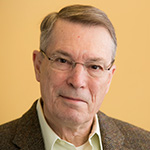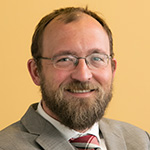About Us
The Institute for Regional Forecasting (IRF) was officially established in 1999 by Dr. Barton A. Smith. It was established as an independent unit of the Hobby Center for Public Policy, now known as the Hobby Center for Public Affairs, and after Dr. Smith's retirement it was moved to the C. T. Bauer College of Business in the fall of 2012, under the direction of Dr. Robert W. "Bill" Gilmer. The Institute’s bi-annual symposia on the Houston economy and local real estate markets have been a community fixture since 1984. The role of the IRF is providing essential, non-biased, economic information to the local community, the centerpiece being the economic outlook for Houston. The IRF provides Houston a center of business and economic expertise focused on local economic issues important to the Houston community. It also provides independent forecasting and other economic services on a contract basis to the public and private sector.
Staff

Robert W. (Bill) Gilmer, Ph.D.
Director, Institute for Regional Forecasting
Room 302M
Classroom & Business Building (CBB)
Phone: 713-743-4651
Email: rwgilmer@uh.edu
Bill Gilmer is Director of the Institute for Regional Forecasting (IRF) at the University of Houston’s Bauer College of Business. The Institute monitors the Houston and Gulf Coast business cycle, analyzing how oil markets, the national economy, and global expansion influence the regional economy. Gilmer is also appointed as an inaugural University of Houston Energy Fellow.
Before joining the Institute, Gilmer served the Federal Reserve Bank of Dallas for 23 years, retiring from the bank as a Senior Economist and Vice President. He joined the Houston Branch of the Federal Reserve Bank of Dallas as a senior economist in 1989, focusing on energy markets and regional growth. He co-managed the 11th District’s regional economic analysis from 2004-2012, and was editor of two of the bank’s regional publications. Gilmer’s work on the Texas economy has been recognized in publications such as the Wall Street Journal, The Economist, and Forbes.
Gilmer also served the Federal Reserve Bank of Dallas as the officer in charge of the El Paso Branch from 2003-2012, overseeing Federal Reserve operations in West Texas and New Mexico. Prior to joining the Federal Reserve Bank of Dallas in 1989, he held the principal economic forecasting position at the Tennessee Valley Authority. He also worked as a research economist at the Institute for Energy Analysis in Oak Ridge, Tennessee and at the Institute for Defense Analysis in Arlington, Virginia.
Gilmer was as an intern in the Texas Governor's office while finishing graduate school, and spent 1987-88 as a Visiting Research Professor at Ball State University in Muncie Indiana.
He was born in Amarillo, Texas, and grew up in El Paso where he earned a Bachelor of Arts in economics from the University of Texas at El Paso. Gilmer later earned a Master of Arts and a Ph.D. in economics from the University of Texas at Austin.

Adam Perdue, Ph.D.
Economist, Institute for Regional Forecasting
Email: awperdueuh@gmail.com
Adam Perdue is a research economist at the Institute for Regional Forecasting at the University of Houston’s C. T. Bauer College of Business. The Institute monitors the Gulf Coast business cycle, including the influence of the national economy, energy and global expansion on Houston area growth. It also conducts other economic studies of policy significance to the Houston area. At the Institute, Adam focuses on factors that affect the whole Houston metropolitan economy, the spatial distribution of economic activity within the Houston area, and the Houston area real estate industry.
Adam is a Houston native and attended the University of Houston receiving a B.S. in Civil and Environmental Engineering and a B.S. in Economics. After two years of working as a transportation engineer in San Antonio, he returned to the University of Houston to obtain his M.A. and Ph.D. in Economics. In graduate school, Adam specialized in Urban and Regional Economics with further interests in Transportation, Labor, and Public Economics.